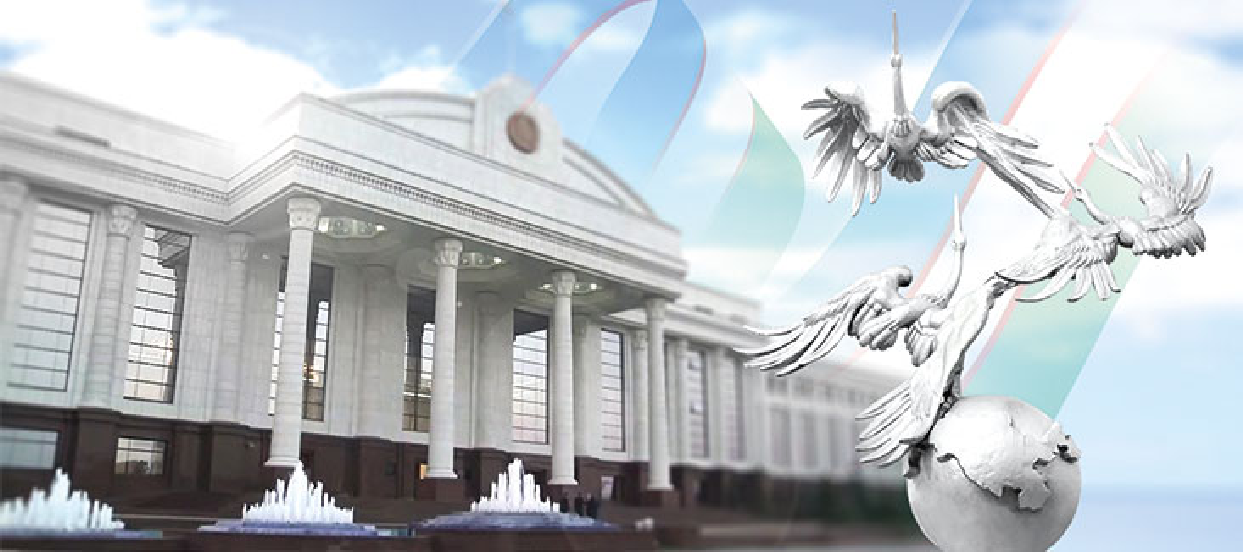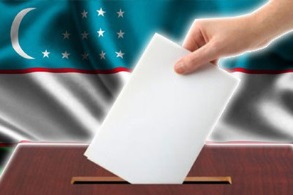Chairman M. Abdusalomov of the Central Election Commission of Uzbekistan

The following article was contributed by the Embassy of Uzbekistan in Seoul for publication.?Ed.
In Uzbekistan the foundation of building a new state and society based on the five principles developed by country's First President Islam Karimov. One of them is the principle of supremacy of law. Therefore, the electoral legislation is considered an essential element of democratic reforms. Elections - the most important issue of democratic legislation, operating in the country, an essential attribute of a democratic law-governed state, the basic form of expression of people's will, the participation of citizens in managing of state and society affairs.
The principles of freedom of choice and will and, first of all, the constitutional right of everyone to vote and be elected to representative bodies of state authority as a basis for a model of the national state.
In Uzbekistan a system of independent election commission headed by an independent constitutional body - the Central Election Commission of the Republic of Uzbekistan - has been introduced. The Central Election Commission was formed by the Oliy Majlis of the Republic of Uzbekistan to organize and conduct elections of the President of the Republic of Uzbekistan, the Oliy Majlis of the Republic of Uzbekistan, as well as a referendum of the Republic of Uzbekistan. Its main activities are based on the principles of independence, legality, collegiality, transparency and fairness.
During the years of independence, as a result of consistent and onward modernization of political, state and legal system, the electoral system, which meets the democratic requirements, has been established. An effective, relevant universally recognized international norms and principles, the legislative, regulatory and legal framework of elections were formed.
Organisational and legal, material and technical conditions for free and active participation of citizens and political parties in electoral processes, reliable guarantees full enjoyment of their electoral rights were created.
The evolution of the national electoral legislation is closely linked with the two main stages of development of the independent republic.
I. On the first main stage of development of the electoral system (1991-2000) the necessary basic legal framework for the formation of elected bodies and the national state as a whole was laid. The electoral legislation provided the successive formation of a fundamentally new democratic electoral system at the initial stage of development.
First of all, the Constitution of the Republic of Uzbekistan adopted in 1992 is the basis of the electoral legal system. The Basic Law of the country secured the universally recognized norms and principles of electoral law: universality, equal and direct suffrage by secret ballot (Article 117 of the Constitution). Basic human rights and freedoms, the principles of democracy, the election of the representative bodies of power at all levels, principles of democratic legal state, ensure political and social pluralism, the primacy of human rights, as well as the universally recognized norms of international law were set.
Before adopting the Constitution the election laws aimed to the formation of the electoral system as a whole were adopted. Thus, the laws "On elections of the President of the Republic of Uzbekistan" and "On referendum in the Republic of Uzbekistan" were adopted in November 1991.
Second, on the basis of constitutional norms by adopting the Law "On Oliy Majlis (September 1993), the legal status, the role and place of the legislative body in the system of public authorities, his powers were determined.
Third, the foundations of the electoral legislation and legal guarantees of electoral rights and freedoms of citizens, the laws "On elections to the Oliy Majlis of the Republic of Uzbekistan" (December 1993), "On elections to regional, district and city councils of people's deputies" ( May 1994), "On guarantees of electoral rights of citizens" (May 1994), and others were laid down.
It is important to note that these laws have been successfully tested and they showed the feasibility of a legal and a practical value and effectiveness during the elections. From own experience of democratic elections a systematic; large-scale work on the improvement of the electoral legislation was carried out, the main directions of which were:

1) The coherent expansion of the electoral rights of citizens and the role of political parties in the formation of representative bodies. It should be noted that in order to ensure a multi-party system and to increase citizen's participation in the political life of society appropriate changes to the electoral law have been made. They were in full conformity with Uzbekistan's obligations under the "Document of the Copenhagen Meeting on the Human Dimension of the CSCE" (1990) and the "International Standards and obligations regarding the right to democratic elections: a practical guide on best practices for democratic elections "(Warsaw, 2002)
Legal norms guaranteeing broad participation of citizens and political parties in the formation of representative bodies, had a significant impact on the dynamics of the development of civil society in Uzbekistan, increased civic activity of the population, thereby filling the process of choosing an alternative and pluralism.
2) The creation of a united, independent system of election commissions from the divisional inspector to the Central Election Commission. The Law "On the Central Election Commission of the Republic of Uzbekistan", under which formed an independent body, was adopted in 1998.
At the same time Central Election Commission was entrusted with carrying out not only the parliamentary and presidential elections but also referendum of the Republic of Uzbekistan. Law was delegated to the Central Election Commission specific authority to regulate in order to enable the Commission to take a formal decision in relation to the various components of the electoral process, which is not determined by the electoral legislation. Decisions of the Central Election Commission adopted within its powers are binding on all lower-level election commissions and referendum commissions, to state bodies, political parties and other public associations, enterprises, institutions and organizations
3.Ensuring openness, publicity and transparency of the elections. One of the key issues of the election process is its openness, the ability to observe the elections. Taking into account the international experience and own practice, the election law stipulated the participation of observers from political parties, media representatives, as well as observers from other states, international organizations and movements at all stages of the electoral process, from the nomination and registration of candidates and ending final voting procedures, vote counting and announcement of the election results.
4.Providing and guaranteeing equal rights for all candidates. The electoral legislation of Uzbekistan was completed the legal norm, which prohibits campaigning, followed by the provision of the voters free of charge or on preferential terms of goods and services (except for information), as well as the payment of cash. This is aimed at preventing cases of bribery of voters, as well as due to the order of election campaign funding only from the state budget and voluntary contributions received and evenly distributed among the participants of the election campaign by the Central Election Commission.
2. The second major stage in the development of the electoral system (with 2001. Now) is closely related to the active democratic renewal and modernization of the country. According to a survey in January 2002, a national referendum was decided to move to a two-chamber parliament, one chamber which operates on a professional basis.
The development of the electoral legislation was accompanied by a progress of democratic reforms, taking into consideration public opinion. Results of the referendum gave a new impact to the development of electoral law, so that was adopted the Constitutional Law of the Republic of Uzbekistan "On the results of the referendum and the basic principles of state power organization", there were some amendments and additions to the Constitution of the Republic of Uzbekistan, at the same time number of changes and additions to the current electoral law were made by the Oliy Majlis of the Republic of Uzbekistan.
Law adoptedby referendum determined the development of the new edition of the Law "On elections to OliyMajlis of the Republic of Uzbekistan". The procedure for nomination of candidates for deputies of the Legislative Chamber, their registration was established, the procedure for the formation of the Senate of Oliy Majlis of the Republic of Uzbekistan and a number of other regulations were determined. 30 per cent quota of women in nominating candidates from the political partieswas introduced.
In November 2010 a "Concept of further deepening democratic reforms and formation of civil society in the country" was introduced at the joint session of the Legislative Chamber and Senate of Oliy Majlis of the Republic of Uzbekistan that marked the beginning of a new stage of the reform process and democratization of the country, further improvement of the scope of state and social construction, legal sphere, particularly the electoral law.
Purposeful work was carried out on the preparation of legal acts on appropriate amendments and addenda to the laws on elections to the Oliy Majlis and local councils of people's deputies.
The rights of observers to attend the conference of the Ecological Movement of Uzbekistan on elections of deputies of the Legislative Chamber, which strengthened the principles of openness and transparency are defined.
In addition, administrative liability for violations of electoral laws was introduced and the procedure for formation of polling stations in places of detention was regulated in order to create additional guarantees of voters' rights, compliance with the electoral law.
By analogy with the law on elections to the Oliy Majlis and local councils of people's deputies of the law "On elections of President of the Republic of Uzbekistan" the appropriate changes arising from the provisions of the Concept of further deepening democratic reforms and formation of civil society in the country were made. Also the number of signatures for the nomination of presidential candidates from 5 to 1% of the total number of voters was reduced.
Summing up, I would like to mention the main features of electoral practice of Uzbekistan.
First. The commitment of the Republic of Uzbekistan which was accepted international standards in the sphere of realization of the rights, freedoms and legitimate interests of the person, the basic principles of a modern model of electoral systems were legally and practically confirmed.
Second. There is a system of independent election commissions headed by the Central Election Commission of the Republic of Uzbekistan which is considered as an independent constitutional body
Third. The electoral law introduced a new institution. It is the quota of seats. Fifteen seats in the Legislative Chamber are allocated to a mass public organization Ecological Movement of Uzbekistan.It is due to the exceptional urgency of the current phase of environmental issues, the struggle for the improvement of the environment, protecting public health.
Fourth. The process of voters registration is one of the important stages of the electoral process, because it serves to determine the exact number of voters in the country in general and in districts with a view to subsequent accounting and vote counting.
Fifth. The number of women should be not less than thirty percent of the total number of candidates nominated by a political party for deputies of representative bodies of state power.
Sixth. A special role in the management of elections is given to Civil Society (mahallas) as the traditional democratic system of government at the local level. Civil Society, unlike other institutions of civil society are provided with rights as the nomination of candidates in the district and city councils of people's deputies, the right to represent the respective district election commissions nominate the members of precinct election commissions for the elections of the President of the Republic of Uzbekistan, as well as elections to the Legislative Chamber of Oliy Majlis of Uzbekistan, regional, district and city councils of people's deputies.
Thus, ensuring freedom of suffrage and development of electoral law is a further deepening of democratic reforms and is one of the decisive factors in achieving the objectives for the development of a strong civil societyin Uzbekistan,.
이경식 기자
edt@koreapost.com

